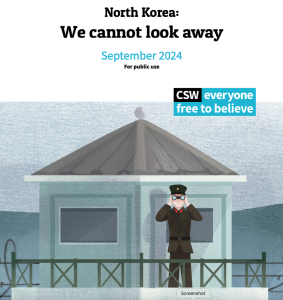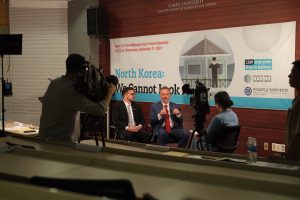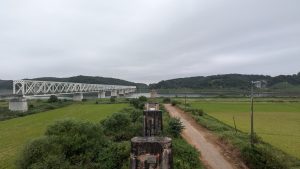 On 11 September Christian Solidarity Worldwide (CSW) published a new report on North Korea which finds that “the Kim regime continues to act with flagrant disregard for international standards and citizens face unparalleled violations of human rights, including of the right to freedom of religion or belief”.
On 11 September Christian Solidarity Worldwide (CSW) published a new report on North Korea which finds that “the Kim regime continues to act with flagrant disregard for international standards and citizens face unparalleled violations of human rights, including of the right to freedom of religion or belief”.
The report, titled “North Korea: We cannot look away”, commemorates the tenth anniversary of the landmark report of the United Nations Commission of Inquiry (COI) on Human Rights in the Democratic People’s Republic of Korea (DPRK), which concluded that “In many instances, the violations of human rights found by the Commission constitute crimes against humanity… The gravity, scale and nature of these violations reveal a state that does not have any parallel in the contemporary world.”
The new report, which draws on interviews with six North Korean escapees and 17 country experts, finds no improvement in the ten years since the COI report and states in its Introduction: “No evidence exists to suggest that the situation for religion or belief adherents in the DPRK… has undergone significant changes in the ten years since the COI report was written.”
 In a news release following the launch of the report, CSW stated that it “finds that the Kim regime has made no effort to uphold international human rights standards and has taken no steps to participate as an equal and active member of the international community. The situation of human rights in the country remains unchanged at best and may even have deteriorated as a result of the COVID-19 pandemic, an increased prioritisation of weapons testing and development, the introduction of new domestic legislation, and the continued forced repatriation of North Korean refugees from neighbouring China.”
In a news release following the launch of the report, CSW stated that it “finds that the Kim regime has made no effort to uphold international human rights standards and has taken no steps to participate as an equal and active member of the international community. The situation of human rights in the country remains unchanged at best and may even have deteriorated as a result of the COVID-19 pandemic, an increased prioritisation of weapons testing and development, the introduction of new domestic legislation, and the continued forced repatriation of North Korean refugees from neighbouring China.”
In his Foreword to the report Lord David Alton of Liverpool, Chair of the UK Parliament’s All Party Parliamentary Group on North Korea, writes: “Central to the report’s findings is that ten years on, egregious denial of fundamental human rights, including the right to freedom of thought, conscience, and religion remains and if anything, the situation has deteriorated. Moreover, North Korea remains one of the most repressive and controlling states on earth for religious groups. Crimes against humanity persist and the state acts with total impunity while Kim’s regime is insouciant towards its obligations under international law…
“If anything, the situation has worsened under Kim Jong-Un. The forced refoulement of North Korean refugees to North Korea by China, in direct contravention of the 1951 Refugee Convention, has made China complicit in the crimes against humanity identified by the UN Commission of Inquiry. Forcibly returned refugees face some of the most inhumane treatment under the regime and CSW highlights the plight of North Korean refugees as one of the most dangerous and harrowing journeys to freedom in the world today.”
North Koreans who manage to escape to China are vulnerable to harassment and trafficking as well as forced repatriation, and those who flee to Laos face similar challenges, making Thailand their only viable option. The new report points out that numbers escaping the country have reduced dramatically since 2020 because of pandemic restrictions. Thousands escaped each year throughout the 2010s, down to 63 in 2021 and 67 in 2022.
Freedom of Religion or Belief
 The report states that “There is no freedom of thought, conscience, religion or belief in the DPRK, and any citizen who expresses an opinion or a belief which differs from the regime’s propaganda faces severe punishment.” It adds that punishment for offences such as possessing a Bible may include torture, detention in brutal political prison camps, forced labour or even execution.
The report states that “There is no freedom of thought, conscience, religion or belief in the DPRK, and any citizen who expresses an opinion or a belief which differs from the regime’s propaganda faces severe punishment.” It adds that punishment for offences such as possessing a Bible may include torture, detention in brutal political prison camps, forced labour or even execution.
Many of the individuals interviewed by CSW for the report suggested that the human rights situation, including the right to freedom of religion or belief, has deteriorated in the past ten years. One country expert stated, “The situation is miserable. The violation of human rights inside North Korea is egregious, and I’m afraid it’s getting worse… The situation for freedom of religion is the same.” Another said, “There is no freedom of religion. The situation is absolutely abysmal.” A North Korean defector stated, “We don’t have any religion. Only one religion is Kim Il Sung.” A second said, “Juche ideology [is] not theory, it’s a religion.”
The report finds that while all religions face repression Christianity is particularly targeted, probably due to the extent to which it counters Juche, the official state ideology. A country expert explained that when Kim Jung Un succeeded his faither “he was deeply concerned, I think even as his father and grandfather were, that if Christianity took root in a meaningful way that it had a great capacity for explosive growth. So, I think he just turned the screws down as hard as he could, and I think more or less that’s still going on.”
Another country expert stated, “The few cases that we do have about people who have practiced religion or come in contact, or even been in the process of smuggling religious materials, mostly Bibles, they would have the most harshest punishment of political prison camps and also the death penalty.”
Perhaps surprisingly, three interviewees suggested that Christian materials within the DPRK may have increased slightly over the past ten years. One who works for a Christian organisation in South Korea linked this to Covid lockdowns, saying: “The number of requests we receive for Bibles from North Koreans… doubled every year during the corona virus.” They understood this to be because regular house searches by North Korean authorities were suspended under pandemic measures so North Koreans were better able to store and transport materials, including Bibles, using their homes as “waystations”.
Another interviewee who has contact with Christians in North Korea said that the activities of the underground church primarily consist of reading the Bible and listening to religious radio broadcasts and stated that both activities increased during the pandemic.
Interviewees reported that among the first questions the authorities ask repatriated North Koreans is whether they had contact with Christians. “Forcibly repatriated refugees are treated harshly, principally I think because what they did is considered to be a betrayal,” said a DPRK expert. “One of the first questions is ‘have you been with Christians?’ and then consequences get more serious as a result of that.”
Speaking about repatriation, a defector reported, “In North Korea they gave three questions: first question is ‘did you meet South Koreans’, second question ‘did you watch porn’, and third one is ‘did you go to the church’.”
A country expert explained that when North Korean escapees are forcibly returned by China they are debriefed and interrogated for months. The expert said: “Fundamentally they ask them two questions: ‘Did you come across any South Koreans?’ ‘Did you come across any Christian missionaries?’ These are the two biggest problems. So, if you’re suspected… of having come across missionaries, you’ll be in trouble. At the very least you’ll be sent to a re-education through labour camp or Kyohwaso for three years, worst case scenario maybe Kwanliso, a political prison camp. You can also be killed.”
Recommendations
The stated aim of the new report is “to generate further discussion and innovative thinking among researchers, policymakers, civil society and funders on how to address human rights violations in the DPRK post-COI” and it includes many recommendations to various governments and international bodies and to civil society.
Among recommendations to the DPRK are several that pertain to Christians:
- Uphold, in law and practice, freedom of religion or belief as stipulated in Article 18 of the International Covenant on Civil and Political Rights.
- End the violent, targeted persecution of Christians across the nation.
- Clarify the fate and whereabouts of missionaries Kim Jeong-wook (also transliterated Kim Jong Uk), Kim Kook-kie (also transliterated Kim Kuk-gi) and Choi-Chun-gil and allow them to contact their families, lawyers and consular officials.
- Immediately return all abductees, detainees and unrepatriated Prisoners of War, including missionaries Kim Jeong-wook, Kim Kook-ki and Choi Chun-gil.
The report also recommends that the UN and member states submit questions and recommendations to the DPRK concerning Kim Jeong-wook, Kim Kook-ki and Choi Chun-gil in the fourth cycle Universal Periodic Review.
Read Church in Chains’ North Korea Country Profile.
(Christian Solidarity Worldwide)
Images: Christian Solidarity Worldwide
